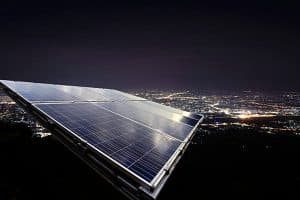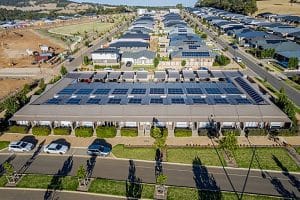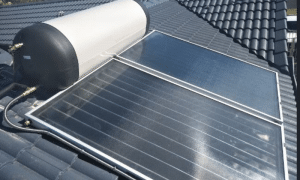South Korean scientists have developed a hybrid solar cell capable of converting both light and heat from the sun into electricity at voltages five times higher than standard hybrid systems.
This was achieved by pairing dye-sensitised photovoltaic film with a unique transparent polymer.
The work could have significant implications for research into enhancing the photo-conversion efficiency (PCE) of photovoltaic cells.
Currently, most solar panels access only some solar radiation – that is, visible light – while the UV and infrared ends of the spectrum are absorbed as heat, which impacts on the overall efficiency of the panel. Hybrid solar power systems are designed to overcome this problem by introducing materials or devices that can capture more of the sun’s energy.
Led by Professor Eunkyoung Kim from Seoul’s Yonsei University, the research team utilised a clear, flexible polymer called PEDOT, or poly 3, 4-ethylenedioxythiophene, which heats up when exposed to light and can store heat as energy. Both highly conductive and fully transparent, PEDOT is considered the perfect organic film for use where light and circuitry are combined, such as LED displays and solar technology.
To build the hybrid system, the researchers placed a dye-sensitized solar cell on top of the PEDOT film. Below that, they added a pyroelectric thin film and a thermoelectric device, both of which convert heat into electricity.
As the system is exposed to sunlight, the dye-sensitised solar cell goes to work, absorbing and converting visible light to electricity, while leftover solar radiation is transferred to the PEDOT film in the form of heat, which the remaining layers of the system convert to energy.
The scientists say the efficiency of all hybrid components working together was more than 20 per cent higher than the solar cell alone.
The work, “Photothermally-Activated Pyroelectric Polymer Films for Harvesting of Solar Heat with a Hybrid Energy Cell Structure”, was published in the journal ACS Nano.
Yonsei University is one of Korea’s three “SKY” universities (Seoul National University, Korea University, and Yonsei University) and considered among the most prestigious in the country.
Our professional solar installers in Melbourne will assess and determine your energy needs. We customise a solar panel system in Melbourne to fit the roof size of your property, ensuring you receive the most suitable solar panel system for your Melbourne home, meeting to property’s energy requirements.







































